The role of a US employment lawyer is central in navigating the complexities of workplace laws and legal issues. They assist both employers and employees in understanding their rights and obligations under various state and federal employment statutes, ensuring compliance and resolving disputes that may arise in the workplace.
Skills necessary for an employment lawyer include a deep comprehension of employment laws and regulations, analytical thinking, negotiation skills, and strong communication abilities to effectively represent and advise their clients.
Candidates can write these abilities in their resumes, but you can’t verify them without on-the-job US Employment Lawyer skill tests.
In this post, we will explore 8 essential US Employment Lawyer skills, 7 secondary skills and how to assess them so you can make informed hiring decisions.
Table of contents
8 fundamental US Employment Lawyer skills and traits
The best skills for US Employment Lawyers include Employment Law Knowledge, Legal Research, Litigation Skills, Negotiation, Communication, Analytical Skills, Attention to Detail and Client Counseling.
Let’s dive into the details by examining the 8 essential skills of a US Employment Lawyer.
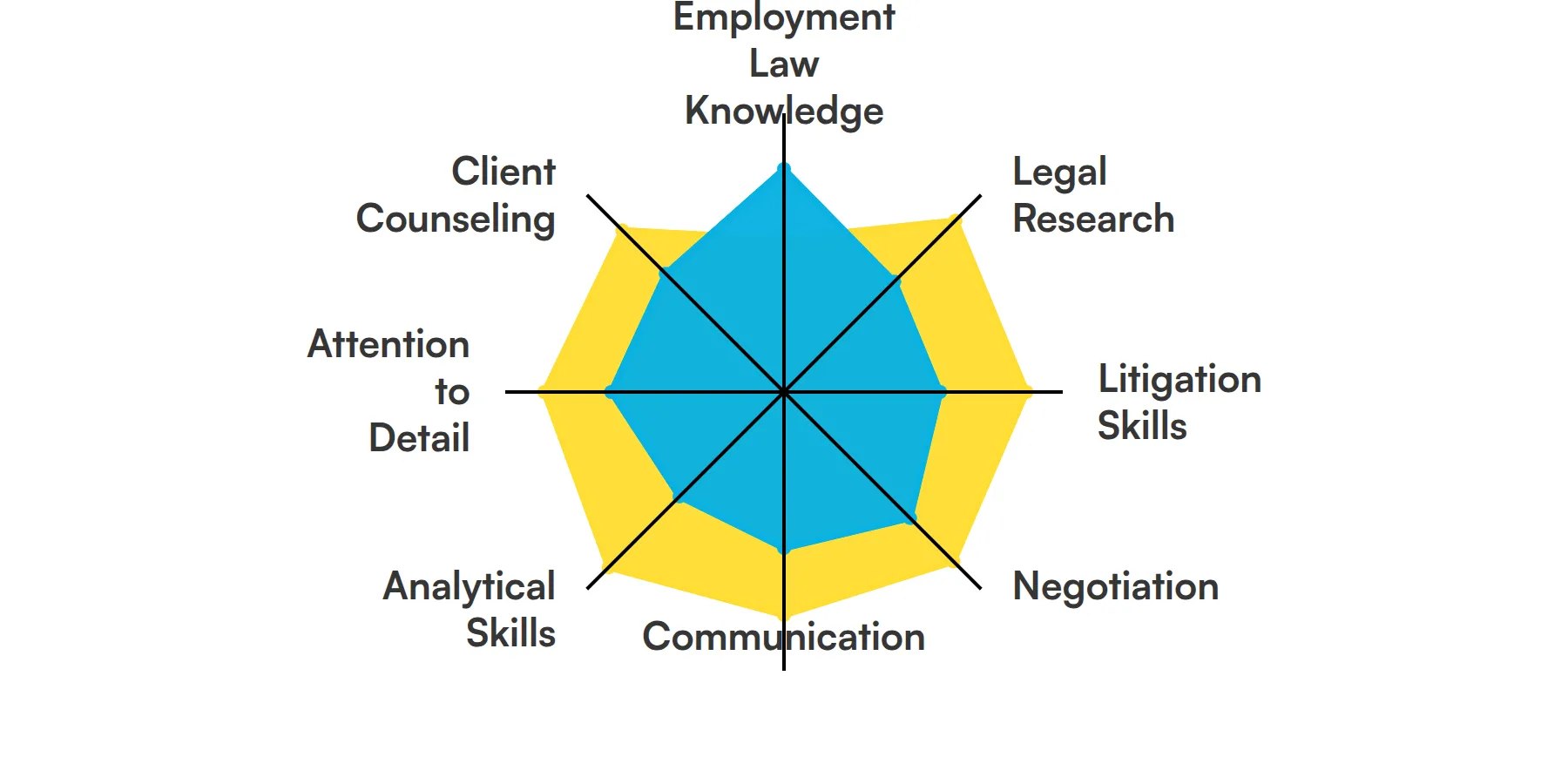
Employment Law Knowledge
An employment lawyer must have a deep understanding of federal and state employment laws. This includes statutes such as the Fair Labor Standards Act and the Americans with Disabilities Act. Expertise in these areas allows the lawyer to effectively advise clients and ensure compliance.
For more insights, check out our guide to writing a US Employment Lawyer Job Description.
Legal Research
Strong research skills are critical for an employment lawyer to find precedents, interpret statutes, and provide informed legal counsel. This involves analyzing case law, legal documents, and regulations to build solid arguments.
Litigation Skills
Litigation skills are essential for representing clients in court or negotiations. An employment lawyer uses these skills to prepare cases, draft pleadings, and engage effectively in trials or settlement discussions.
Negotiation
The ability to negotiate effectively is key in resolving employment disputes. Lawyers often negotiate employment contracts, severance agreements, or settlements, balancing the interests of their clients with opposing parties.
Communication
Effective communication is crucial for an employment lawyer to articulate legal advice clearly to clients. They must also craft persuasive arguments in writing and orally when presenting cases in court or negotiating settlements.
Analytical Skills
Analytical skills enable employment lawyers to assess and interpret complex legal issues and frameworks. This includes the ability to identify relevant facts, apply legal principles, and reach logical conclusions to support their clients' cases.
Check out our guide for a comprehensive list of interview questions.
Attention to Detail
An eye for detail is necessary to scrutinize documents such as employment contracts, policies, and case files. Understanding nuances in these documents helps in identifying legal risks and potential disputes.
Client Counseling
Providing informed advice and support to clients on employment-related matters is a core duty of an employment lawyer. This involves understanding the client's situation, offering strategic options, and guiding them through legal processes.
7 secondary US Employment Lawyer skills and traits
The best skills for US Employment Lawyers include Time Management, Ethical Judgment, Technology Proficiency, Crisis Management, Public Speaking, Empathy and Cultural Competence.
Let’s dive into the details by examining the 7 secondary skills of a US Employment Lawyer.
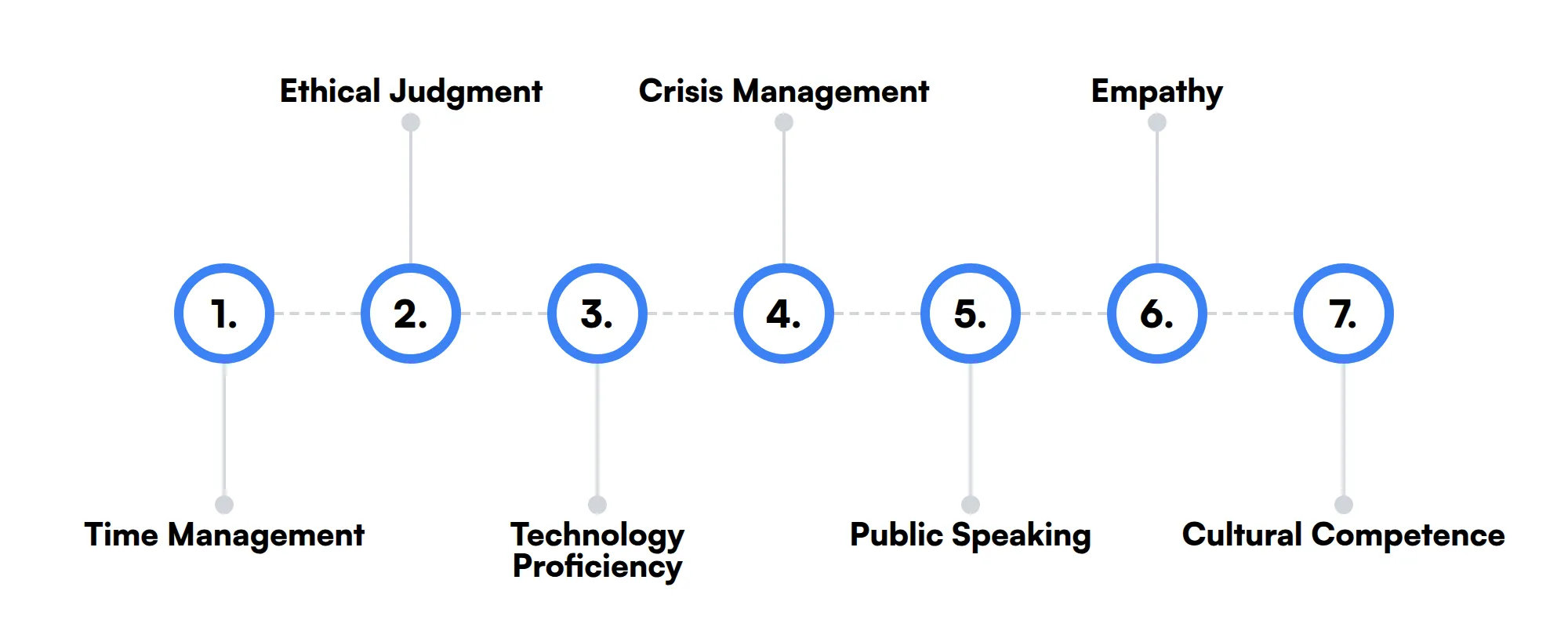
Time Management
Employment lawyers need to manage multiple cases and deadlines efficiently, ensuring each client receives timely and thorough attention without compromising on the quality of legal services.
Ethical Judgment
Applying ethical judgment is crucial as employment lawyers navigate sensitive issues that may involve discrimination or harassment claims, requiring them to uphold integrity and professional standards.
Technology Proficiency
Proficiency in legal technology tools can enhance an employment lawyer's efficiency in legal research, case management, and document preparation, keeping pace with the evolving legal landscape.
Crisis Management
Handling unexpected developments in a client's case competently and swiftly is vital. Employment lawyers often deal with urgent issues that require quick yet informed decision-making.
Public Speaking
Public speaking skills allow employment lawyers to represent their clients confidently in court proceedings, public seminars, and other forums, effectively communicating their client's position.
Empathy
Understanding clients' perspectives and emotional states, especially in sensitive employment matters, helps build trust and provide more compassionate and personalized legal advice.
Cultural Competence
Navigating diverse workplace environments requires cultural competence. Employment lawyers benefit from understanding cultural differences to better advocate for clients in varied contexts.
How to assess US Employment Lawyer skills and traits
Assessing the skills and traits of a US Employment Lawyer goes beyond simply reviewing their resume or qualifications. An effective evaluation involves examining their expertise in critical areas such as employment law knowledge, legal research, and litigation skills. These competencies ensure they can navigate the complexities of employment-related legal matters and provide accurate and strategic advice.
While traditional interviews may touch on negotiation and communication abilities, they can often overlook other essential attributes like analytical skills, attention to detail, and client counseling. To truly understand a candidate's capabilities, employers are turning to modern methods that provide a comprehensive view of their practical skills.
Tools like Adaface on-the-job skill tests can significantly enhance the hiring process. With an 85% reduction in screening time, these assessments allow employers to make informed decisions by focusing on the real-world application of a candidate's skills and traits, ensuring a suitable match for the role at hand.
Let’s look at how to assess US Employment Lawyer skills with these 5 talent assessments.
US Employment Law Test
Our US Employment Law Test evaluates a candidate's understanding of key employment laws and regulations affecting the workplace. It focuses on areas like employee rights, workplace discrimination laws, and wage and hour laws.
The test gives a comprehensive assessment covering diverse topics such as hiring and firing practices, compliance with the Family and Medical Leave Act, employee benefits and compensation, and labor relations. It also explores workplace safety, harassment policies, and workers' compensation.
Candidates who perform well demonstrate significant insight into privacy rights and unemployment compensation. They can confidently apply legal principles in real-world scenarios involving occupational safety and health regulations.
US Contract Law Test
Our US Contract Law Test assesses a candidate’s understanding of fundamental concepts in contract law. It includes offer and acceptance, breach of contract, and performance and discharge, ensuring candidates are prepared for contract management tasks.
The test examines their knowledge of areas such as remedies, third-party rights, mutual assent, and the statute of frauds. It challenges candidates to grasp essential legal principles and apply them effectively in practical scenarios.
High-scoring candidates show proficiency in the parol evidence rule and unconscionability. They are adept at handling scenarios involving consideration and legality, showcasing their competence in managing contract-related legal concepts.
Communication Skills Test
Our Communication Skills Test evaluates candidates' abilities in verbal and written communication, active listening, and other interpersonal skills. It's designed to assess how well candidates can communicate with customers, colleagues, and stakeholders.
The test explores areas such as situational judgment, attention to detail, and critical thinking. It focuses on determining how effectively candidates can handle diverse communication scenarios.
Candidates who succeed show notable verbal reasoning, with the ability to summarize and convey complex information clearly and concisely. They demonstrate adeptness in tailoring communication styles to different audiences.
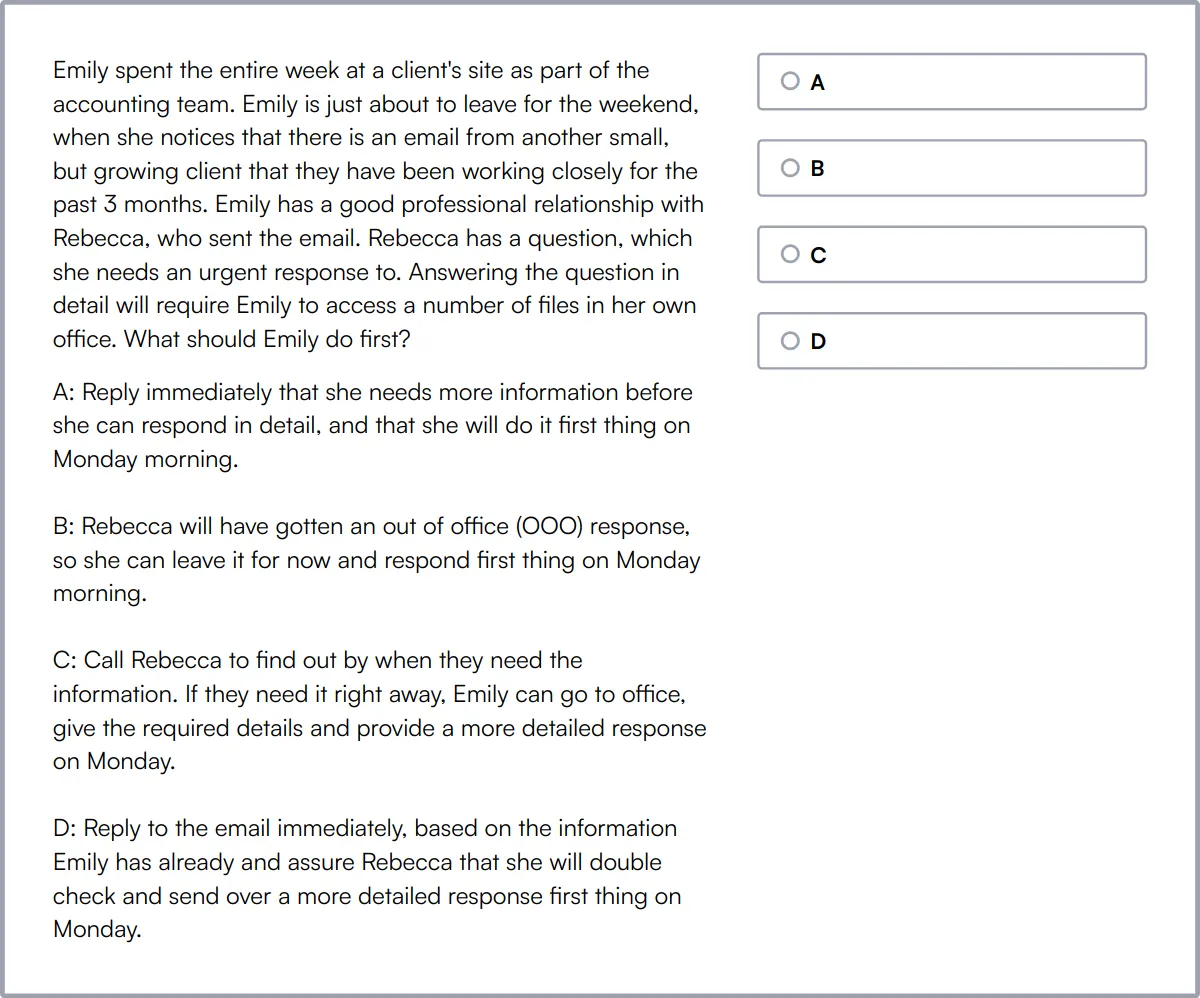
Analytical Skills Test
Our Analytical Skills Test evaluates a candidate's ability to comprehend scenarios, identify key information, and draw conclusions. It covers a broad range of skills necessary for data-driven decision-making.
The test covers logical reasoning, numerical reasoning, and data interpretation to gauge the candidate’s analytical mindset. It focuses on problem solving and applying logic in complex situations.
Candidates excelling in this test exhibit strengths in verbal reasoning and data visualization, demonstrating their capability to assess and combine diverse information sources into coherent strategies.
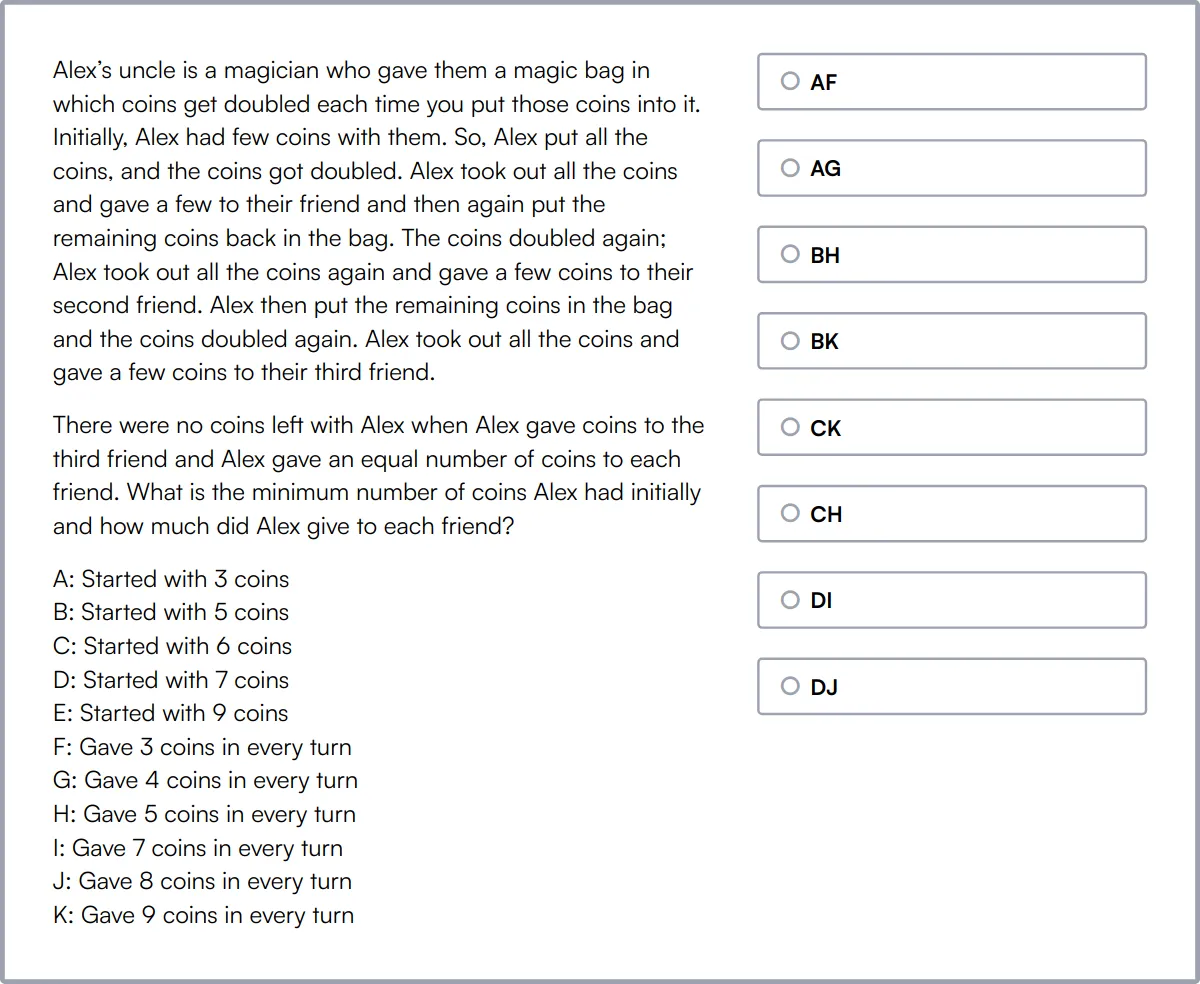
Attention To Detail Test
Our Attention to Detail Test assesses a candidate’s ability to maintain focus and thoroughness in detail-oriented tasks. It's pivotal for roles requiring accuracy in information processing.
The test examines candidates on proof-reading, identifying mistakes, and detecting typos. It focuses on their capability to verify data and ensure consistency in work output.
High-scoring candidates demonstrate strong skills in following instructions and verifying data accuracy, which are necessary for achieving high-quality outcomes in detail-focused roles.
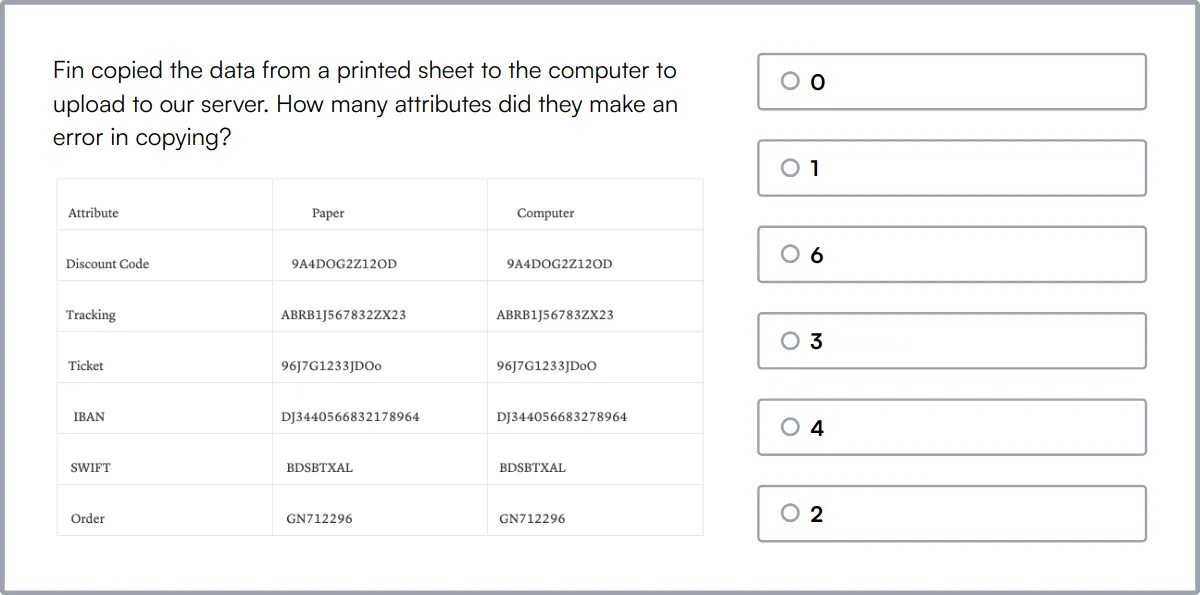
Summary: The 8 key US Employment Lawyer skills and how to test for them
| US Employment Lawyer skill | How to assess them |
|---|---|
| 1. Employment Law Knowledge | Evaluate understanding of federal and state employment laws. |
| 2. Legal Research | Test ability to find and interpret relevant legal information. |
| 3. Litigation Skills | Assess capability in representing clients during legal proceedings. |
| 4. Negotiation | Judge talent in reaching favorable settlements for clients. |
| 5. Communication | Determine clarity and coherence in legal discussions and documentation. |
| 6. Analytical Skills | Analyze capability to break down complex legal issues effectively. |
| 7. Attention to Detail | Check precision in reviewing and drafting legal documents. |
| 8. Client Counseling | Assess proficiency in advising clients on legal matters. |
US Employment Law Test
US Employment Lawyer skills FAQs
What is the importance of Employment Law Knowledge for a US Employment Lawyer?
Understanding employment laws is core to an employment lawyer's role. This knowledge allows them to advise clients accurately, ensuring compliance with federal and state regulations.
How can legal research skills be assessed during recruitment?
Assess legal research skills by asking candidates to analyze a hypothetical legal scenario, focusing on their ability to find and interpret relevant case laws and statutes.
What makes negotiation skills critical for an employment lawyer?
Negotiation skills help lawyers settle disputes effectively, reaching agreements that serve their clients' best interests without resorting to litigation.
Why is communication a key skill for employment lawyers?
Strong communication ensures that lawyers can convey complex legal information clearly to clients, judges, and other legal professionals, influencing outcomes positively.
Why is cultural competence important in employment law?
Cultural competence enables lawyers to understand diverse client backgrounds, fostering better attorney-client relationships and more tailored legal advice.
What role does technology proficiency play for an employment lawyer?
Being proficient with legal technology tools helps lawyers manage cases more efficiently, conduct research, and collaborate with clients and colleagues.
How do you evaluate a candidate's ethical judgment in hiring?
Evaluate ethical judgment through scenario-based questions that test decision-making, focusing on adherence to legal standards and professional conduct.
How can empathy be advantageous in employment law?
Empathy allows lawyers to better understand and relate to clients’ situations, leading to stronger advocacy and more effective legal strategies.

40 min skill tests.
No trick questions.
Accurate shortlisting.
We make it easy for you to find the best candidates in your pipeline with a 40 min skills test.
Try for freeRelated posts
Free resources



